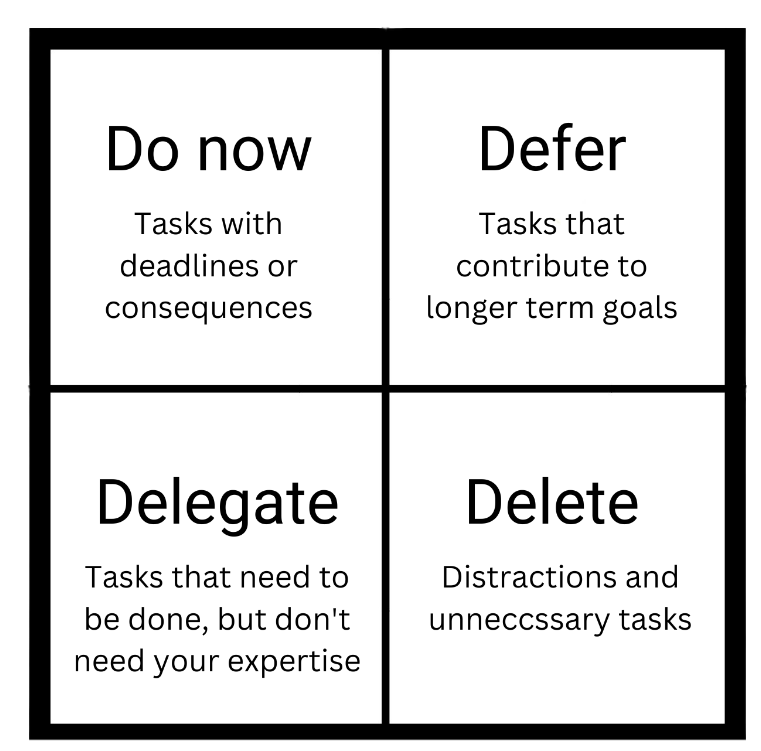Time
Volume 8: May 2023
As May arrives it can often feel like time speeds up and we move towards the end of term and another school year at a frightening pace. This term is often punctuated by parent consultations, report writing, study leave and exams, timetables, improvement plans, school dances, leaver assemblies and much more.
As your 'to do' lists inevitably grows and you wing your way through the final term it feels appropriate that our theme this month is time related. We're going quite practical this month and sharing the Eisenhower matrix with you. The matrix is a tool that can help you to prioritise your to do list, it (of course) doesn't give you more time but it can help you to feel a bit more in control of your list rather than your list controlling you.
Time, there's never enough of it
The Eisenhower matrix takes it's name from the 34th U.S President who used it to help him make decisions about what to focus on. In a 1954 speech, Eisenhower said :
“I have two kinds of problems, the urgent and the important. The urgent are not important, and the important are never urgent.”
Urgent means it needs to be done now, urgent things are usually visible and tangible now. They demand your attention and action. Important things involve the outcome and impact of your work, the 'bigger' things, the things that require you to be creative, strategic and involve relationships. Not being urgent, you can find it hard to get to these things.
The matrix helps you to organise your tasks according to importance and urgency. It helps you divide your tasks into four categories: the tasks you’ll do first, the tasks you’ll schedule for later, the tasks you’ll delegate (if possible), and the tasks you’ll delete. It helps you to work out what's worth your time now and in the future.
How to distinguish between urgent & important
Urgent tasks require your immediate attention. When something is urgent, it must be done now, and there are clear consequences if you don’t complete these tasks within a certain timeline.
Important tasks may not require immediate attention, but these tasks help you achieve your bigger, longer term goals. Just because these tasks are less urgent doesn’t mean they don’t matter.
The Eisenhower Matrix
Getting started
It might sound obvious but first of all you need to get all the things down on paper, post-its, or in a word document. When I say 'all the things', I really mean all, everything. Nothing is too small, or too big.
Holding things in your head takes up space and influences how efficient and effective you are at actually getting things done. You might find it helpful to create two lists - school and home.
Working through your 'to do' list you will then allocate tasks to the appropriate quadrant.

Quadrant 1: Do
This is where you place any tasks that are both urgent and important. When you see a task on your to-do list that must be done now, has clear consequences, and affects your long-term goals, place it in this quadrant.
This is probably the easiest part because identifying the urgent and important tasks tend to be front of mind.
Quadrant 2: Schedule
Quadrant two is the “defer” quadrant - the tasks that aren't urgent but are still important. Because these tasks affect your long-term goals but don’t need to be done right away, you can schedule these tasks for later.
The important thing to remember is that you need to plan when you will do these things because there is a danger that the urgent things take over, meaning that you never quite 'get' to these tasks. I like to put these things in my diary so that I know I'm planning time for them.
Quadrant 3: Delegate
You might not have anyone to delegate these urgent but not important tasks to and that can feel frustrating. Understanding what these tasks are can help you manage your tasks in the future, help you to be mindful of what you take on or end up assuming responsibility for.
Quadrant 4: Delete
Once you’ve gone through your to-do list and added tasks to the first three quadrants, you’ll notice that you have some tasks left - these are the ones that aren't urgent or important but are probably getting in the way! These are the tasks that can often be deleted - that can be quite a good feeling!
How it feels...
How you spend your time affects how you feel. Ideally, you want to be spending a good amount of time in the 'important, not urgent' quadrant. We need balance, spending too much time in the urgent spaces can lead to feeling stressed and overwhelmed.
Urgent, important - feels like firefighting Important, not urgent - feels planned and intentional Urgent, not important - feels stressful
Not important, not urgent - feels like being stuck
Coming up next month
Next month we have a guest author, Dr Lucy Kelly from the University of Bristol. Lucy has written many articles on teacher wellbeing and reflective practice. She's the lead researcher on the 'Reimagining the Diary' project and has recently published 'Reimagining the Diary - Reflective practice as a positive tool for educator wellbeing'. We're delighted that Lucy has agreed to share some wisdom and insights with you.
Want to learn more?
Four Thousand Weeks: Time Management for Mortals by Oliver Burkeman | Goodreads
The Diary Of A CEO with Steven Bartlett | No.1 Podcast
Please send this to a friend or colleague if you think they might find it find it useful too.
Until next time...
Sarah (and the Stepping Stones team)

